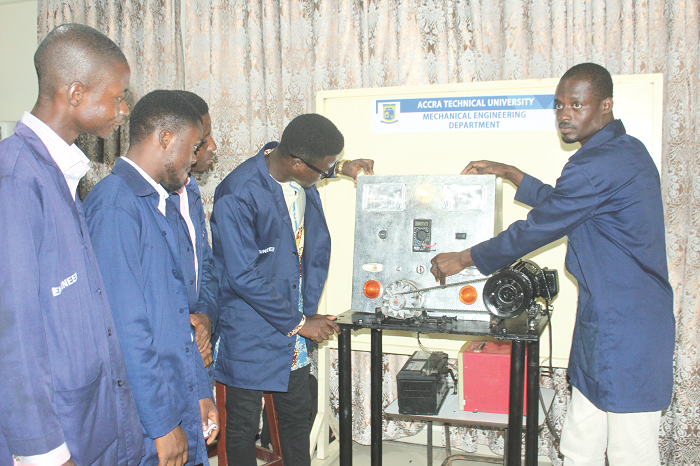
Two institutions observe World Youth Skills Day - Highlight importance of TVET
Accra Technical University (ATU) and the Sunyani Technical University (STU) last Saturday joined the world to celebrate this year’s World Youth Skills Day on the theme: “Development to Improve Youth Employment.”
Advertisement
A three-day national skills exhibition programme was held by all Technical and Vocational Education and Training (TVET) institutions across the country to commemorate the day, with the ATU organising a three-day exhibition under the auspices of the Council for Technical and Vocational Education and Training (COTVET) in Accra last Thursday.
The STU also organised a three-day exhibition on the theme: “The role of TVET institutions in the preparation of quality and competitive skilled manpower for Ghana’s industrial growth” which brought together 10 TVET institutions in the region to showcase what they can produce to spearhead the region’s industrial growth and tackle unemployment in the country.
Annual event
Instituted by the United Nations, the World Youth Skill Day is observed annually on July 15 to create awareness of the importance of TVET and the acquisition of relevant skills for the development of global and national economies.
The annual celebration is to sensitise governments to implement pragmatic interventions to support hands-on job creation and deepen awareness of citizens on economic opportunities that are available in TVET.
From Accra, Dennis Agyei Boateng & Isabella Hackman report that the 2017 World Youth Skills Day has been observed with a call on the government and stakeholders to make significant investments in upgrading the skills of the youth for them to enter into informal sectors.
The Vice Chancellor of ATU, Prof. Sylvester Achio, who made the call at the opening ceremony of a three-day exhibition organised by the ATU last Thursday, noted that the unemployment rate kept on increasing among the youth between the ages of 18 to 24, according to the World Bank data.
Job creation
According to Prof. Achio, the Ghana Labour Market Profile 2014 indicated that there was a huge demand to provide short–term vocational training for workers in the informal economy to improve their small business.
He, therefore, stressed that the importance of practical knowledge, skills and attitudes in any training offered by TVET institutions must not be underestimated.
He said higher technical education institutions in Ghana should be able to equip students with employable and entrepreneurial skills fit for both the formal and informal sector and, therefore, urged stakeholders and industrial players to partner with TVET institutions to reduce the unemployment rate in the country.
Curricula review
The Human Resource Officer of the Regional Directorate of Education, Mr Omane Moses, who represented the regional Director of Education, said the Ghana Education Service (GES) was currently reviewing the curricula to match the job market and for it to focus more on science and information technology.
The Vice Chancellor of the Sunyani Technical University, Professor Kwadwo Adinkrah-Appiah, has urged the government and parents to shift emphasis from theory-based education to TVET to reduce the high rate of unemployment in Ghana, reports Biiya Mukusah Ali from SUNYANI.
He urged the government to make technical and vocational education free from the second-cycle to the Bachelor of Technology (B-Tech) level to make TVET institutions attractive to the youth.
Prof. Adinkrah-Appiah was speaking at the three-day national skills exhibition to mark the World Youth Skills Day at the Sunyani Technical University at the weekend.
He called on the government to improve practical training of TVET students and create more avenues for the training of teachers in technical universities, polytechnics, second-cycle technical and vocational schools to enable them to gain more experience in industry.
He said many of the TVET learning centres, especially the technical universities and polytechnics, were unable to combine theoretical training with practical exposure.
The Brong-Ahafo Regional Director of Education, Mr Osei Asibey, urged all stakeholders to pool their resources to help the youth acquire the needed skills to reduce unemployment in the country.
Mr Asibey also encouraged stakeholders to engage the youth in dialogue from them to appreciate the benefits they could derive from TVET and its related studies.




